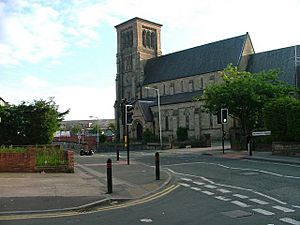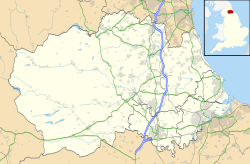St John's Church, Darlington facts for kids
Quick facts for kids St John the Evangelist's Church, Darlington |
|
|---|---|

St John the Evangelist's Church, Darlington
|
|
| 54°31′22″N 1°32′35″W / 54.52278°N 1.54306°W | |
| Location | Darlington |
| Country | England |
| Denomination | Church of England |
| History | |
| Status | Closed |
| Dedication | Saint John the Evangelist |
| Consecrated | 16 July 1853 |
| Architecture | |
| Heritage designation | Grade II listed |
| Architect(s) | John Middleton |
| Groundbreaking | 10 September 1847 |
| Completed | 3 January 1850 |
| Closed | 5 February 2023 |
| Specifications | |
| Length | 106 feet (32 m) |
| Width | 50 feet (15 m) |
| Height | 60 feet (18 m) |
| Spire height | 90 feet (27 m) |
| Administration | |
| Parish | Saint John Darlington |
| Deanery | Darlington |
| Archdeaconry | Auckland |
| Diocese | Diocese of Durham |
St John the Evangelist's Church in Darlington is a historic building. It used to be a Church of England church. The church is located on Neasham Road in County Durham, England. It is recognized as a Grade II listed building. This means it is an important historical structure.
Contents
History of St John's Church
Building the Church
The church was designed by an architect named John Middleton. Construction started in 1847. The first stone was laid on September 10, 1847. A local Member of Parliament, George Hudson, helped with this ceremony. The church was finished and opened for services on January 3, 1850.
Spire and Vestries
The original plans for the church included a very tall spire. It was meant to be about 160 feet (49 meters) high. This spire would have sat on top of the 90-foot (27-meter) tower. However, the spire was never actually built. Later, in 1900, extra rooms called vestries were added to the church. These were designed by W.S. Hicks.
Consecration and Closure
After the church opened, it took a few years to pay off all the building costs. Once the money was settled, the Bishop of Durham officially dedicated the church. This special ceremony, called a consecration, happened on July 16, 1853.
Sadly, the church closed its doors recently. In December 2022, it was announced that the church would close. This was because fewer people were attending services. Also, the costs to keep the building running were too high. The very last service was held on February 5, 2023.
The Church Organs
Early Instruments
When the church first opened, music for services came from a Seraphine. This was a type of musical instrument. In 1857, a pipe organ was given to the church. It was a used organ from Bedale church. However, this organ did not work very well.
New Organs and Famous Players
Because the first organ wasn't good enough, a new one was installed in 1865. This organ was built by Mr. Nicholson from Newcastle upon Tyne. It even used some parts from the older organ. The cost for this new instrument was £150.
In 1890, the church got another new organ. This one was a two-manual organ built by H.S. Vincent and Company. They were organ builders from Sunderland. A famous organist named Philip Armes played the first concert on this new organ. He was the organist at Durham Cathedral. This organ is very special and has a high historical rating.
Church Bells
The church tower holds a set of 8 bells. Five of these bells were put in place in 1848. They were made by Charles and George Mears. Later, in 1893, three more bells were added. These were made by a company called Mears and Stainbank.
 | Tommie Smith |
 | Simone Manuel |
 | Shani Davis |
 | Simone Biles |
 | Alice Coachman |


